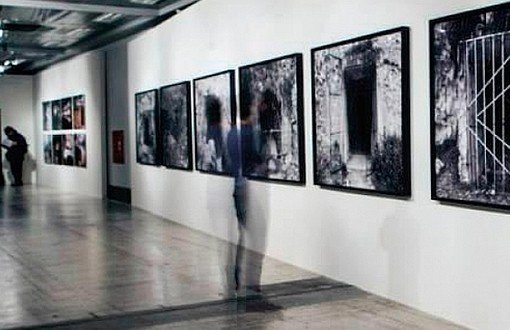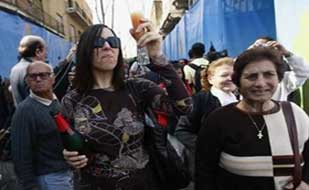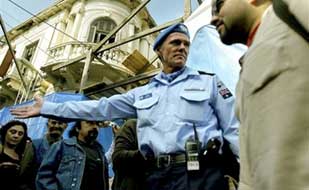The need to maintain secularism in Turkey has led the Turkish state to develop regulations around the public expression of religion, insisting that symbols of religious identity are not permitted in the public sphere.
For many though, this comes across as an impingement on the right to practice religion. Over the years this has engendered an impassioned debate over the interface between religion, secularism, freedom and identity in Turkey, which as of yet remains unsettled.
The president Ahmet Necdet Sezer's recent statement that the headscarf has no place in the "kamusal alan" did not make it entirely clear: does he mean the public sector, i.e. official public institutions?
If he means this, does he mean public/official institutions solely as a physical space, or as an interactive, transactional process, or both? This will have obvious implications on whether regulations apply to the physical space, the service providers, or the service receivers, or some combination of the above.
Without clearly defining the kamusal alan, or limiting it in any way, it can be as broad as you want it to be. However, even while there is this ambiguity over what this kamusal alan exactly is, we can say one thing for sure, and that is that whatever it is, the state has unequivocal control over it, according to official sources.
The public sphere, in democratic theory at least, has traditionally been defined as that space where the public, meaning citizens, associate and interact freely with each other. Terms close to this meaning of public sphere include the polity, the body politic, and civil society.
It is meant to designate the site of citizen action and activity separate from the state; moreover, it is also understood as an essential element to curbing authoritarian tendencies by the state.
In fact, much of the focus of traditional democratic theory is on finding those institutions and processes that strike that critical balance between state power and control, with individual liberty and civic freedom.
The most heated debates in the United States (US), especially today, center on the intrusion of state power in domains conceived as the locus of civic life, or, the public sphere.
If then we take into account this definition and derivation of the public sphere, what becomes most interesting about our recent discourse is the reconfiguration of this term in the Turkish context.
The overall ambiguity of the term has allowed several very different terms (public/public sphere/public sector) to not only bleed into each other but also to be simultaneously and confusingly discussed within legal, theoretical, and sociological frameworks.
In this context, discussions often cloud the discourse even more rather than adding any clarity. Moreover, the resulting conceptual chaos provides room for different actors to appropriate the term for their own purposes. And so, we see the state using the term in a way that suggests its authority, and a certain conception of governance.
It might be useful to look at the example of the United State, where there too the place of religion in public life remains an ongoing and very sore point of tension.
Powerful movements, factions, and organizations representing points of view on all sides of the ideological spectrum have been created solely to tackle this issue.
The Supreme Court spends a good deal of its time taking up cases that deal with the balance between enforcing state interests and exercising religious freedom. These issues will continue to occupy a central place in the public life in the US, just as they will in Turkey.
If that's the case, then do we have anything to learn from the US example? My answer would be yes, yes not because of the existence of any particular outcome or resolution (since there is none, and both countries must come up with their own solutions anyway) but because of the process through which these issues are developed and discussed in the US.
Reference was already made to the existence of diversity in perspectives, but beyond this, there is also the existence of a plurality of legal models, specifically at the state level that each add another layer of depth and consideration.
For example, at times the law has required that in introducing regulations concerning religion, the state must demonstrate that it is pursing a compelling state interest, and has used the least restrictive means to do so. Other criteria requires taking into account the degree to which entrenched social or economic inequities are reproduced by the proposed regulation.
The importance of this is that the discussion in the US has looked at these arguments from multiple angles, and from the vantage point of the citizen in particular. We see that the public sphere and the judiciary have asked of the state to justify its rationale, and have erected certain parameters within which the state may act.
We also see how the prioritization of competing state interests are also debated and discussed - in the public sphere - and from there integrated into legal rulings. We also see how the law has also introduced the dimension of inequality and injustice into this issue.
In Turkey, what we are seeing instead is a very static and limited discussion of "kamusal alan" and the role of religion. Where there isn't the vagueness in trying to define "kamusal alan", there is instead the wielding of absolutes, the recurring black or white scenario: either we are a secular country, or we are not a secular country!
Such polarizations can only lead to emotional outpourings that create a win-all or lose-all situation, within which no settlement will be possible. But we know that within politics there is no one right answer, no black or white. This means that in order to achieve the best possible solution, the right questions need to be asked and the right issues need to be put forth.
So, rather than remaining mired in the lack of clearly defined terminology, we should use this ambiguity as an opportunity to add refinement and nuance to these issues. For example, would Turkey be able to tolerate and even validate multiple approaches to this issue, without resorting to extremes? Also, what are the priorities of the Turkish state, and why?
Who defines these priorities and how? When priorities overlap or compete with each other, what measures are used to determine which one takes precedence? For example, in the case of the universities, the state has two competing interests: to enforce secularism and to ensure widespread and equitable access to education.
A more updated, measured discussion then requires examining the consequences of different models for the solution to this issue: How far is secularism jeopardized, how much is the right to education being denied, what are the long-term political, social, and economic ramifications of these decisions?
Instead of blanket statements about what constitutes appropriate activity in a "resmi alan", we should ask which actions truly threaten the integrity of the resmi alan and why.
All of this simply gets to the importance of having a nuanced debate that can yield a rhetorically clear and productive discussion. Only then can we build real consensus around new norms and understandings of governance.
Above all though, we should ask who in Turkey has the authority to not only settle these questions, but to raise and define our social and political norms.
And so we return to the "public sphere".( RZ/NM)







